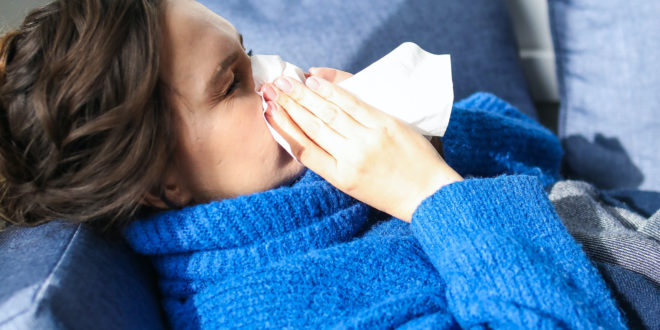Colds and flu are often confused for one another, especially when it comes to treatment. They are, in fact, two different illnesses. The common cold is an inflammation of the mucous membranes caused by a number of viruses. Influenza is an acute viral infection of the respiratory tract.
Colds tend to begin slowly, with a sore throat, sneezing and runny nose. Temperature may be normal or slightly elevated. The flu comes on quickly. Headache, dry cough, chills; muscle aches and high temperature are all common. Flu symptoms are more severe than those of a cold.
Cold viruses may cause:
- Nose and throat irritation
- Watery eyes
- Headaches
- Fever
- Chills
- Muscle aches
When flu takes hold, symptoms are accompanied by:
- High fever
- Hoarse cough
- Aching back, arms and legs
- Enlarged lymph glands (sometimes)
How will I know if a cold or flu requires medical attention?
Most colds and flus are self-limiting. However if symptoms become severe or last more than about a week, medical advice should be sought. People more at risk of complications from colds and flu include the elderly, those with a chronic medical condition (such as heart disease), or those with a depressed immune system.
Consult your healthcare professional if:
- Your cold lasts for more than 7 days
- Your cough is severe and long-lasting and accompanied by shortness of breath, wheezing, chest pains or tightness, a temperature, headache, back and leg aches, fatigue, rashes, or weight loss
Should you feed a cold and starve a fever?
We feel this advice may have been offered when there was nothing you could do to help a fever! The best guidelines are to only eat when you feel hungry, and that when you are ill, to eat nutritious food that will assist your recovery. It is very important to keep well hydrated by drinking frequently. Regular sips of warm caffeine-free drinks, hot soups and plain filtered water are all good.
Can I catch a cold by sitting in a draught, getting cold or being caught in the rain?
You catch a cold by touching something with the cold virus on it and then touching your nose or face or by breathing in a virus directly from someone who sneezes near you. Perhaps getting cold or caught in the rain, etc may weaken your resistance to the virus and make you more susceptible.
Are there any foods I should avoid when I have lots of mucus?
We need some mucus for proper body function as mucus forms the first line of defence against airborne infections. Mucus contains leukocytes, which are the primary cells that fight against infection and tissue damage. However, if a diet is too high in acid-forming foods, (dairy products, sugar and excess grains) the body tends to produce excess mucus and this may create congestion. This congestion of mucus can then be a conductor for growth of bacteria and viruses and other insoluble substances.
Steps you can take to avoid excessive mucus production:
- Drink plenty of liquids. Water, tea, fruit juice, fruit drinks, carbonated beverages or broth based soups. Liquids help thin mucous secretions. Chicken soup has been shown to thin mucous secretions
- Fruit juice or drinks can be thinned with water
- Avoid dairy products like cream based soups, ice cream, pudding or milk as they increase phlegm
How can I avoid getting a cold?
“An ounce of prevention is worth a pound of cure.” Try to build a strong immune system by eating well, exercising regularly (when you are not sick), avoiding cigarettes and drinking plenty of filtered water. Also try to avoid areas where there are likely to be people with colds. Cold viruses often survive for hours in the open, on door handles, benches and other surfaces, so wash your hands frequently and thoroughly!
If you feel a cold coming on:
- At the first sign of illness, slow down immediately and rest to prevent the cold from taking hold. It is better to stop activity in the short term rather than having your activity stop you!
- Maintain a healthy lifestyle. Get 8 hours sleep, relax often, eat moderately, drink plenty of pure water and decrease consumption of alcohol, coffee, and sugar.









gerald - 9 years ago
in my care home several of us have had a ‘flu’ bug. Sore throat, runny nose, and an awful cough. Mine lasted three weeks. Some only a week. One still has the cough after eight weeks. It’s a virus, and has easily spread.